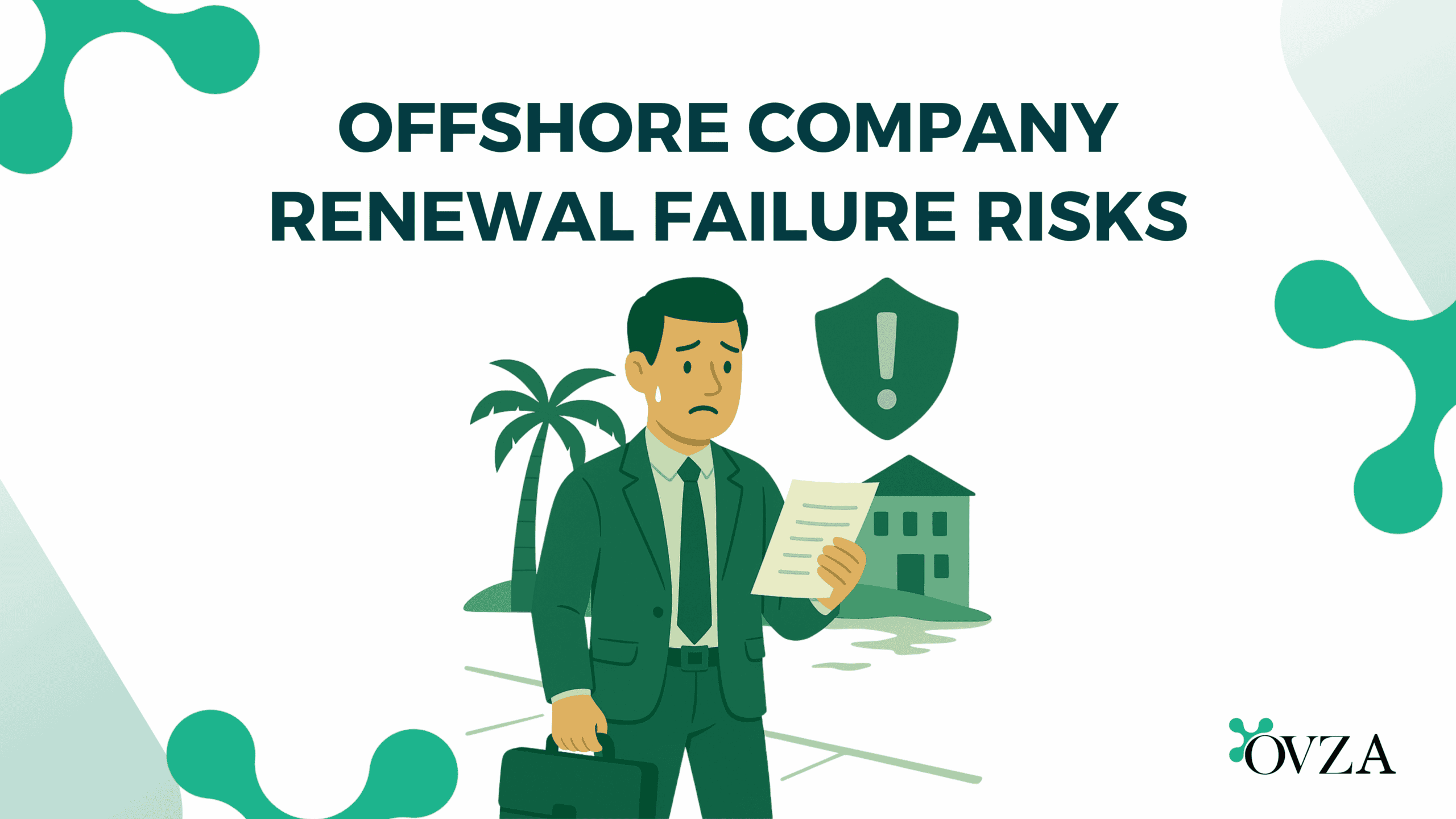Failure to renew offshore companies leads to penalties, loss of good standing, regulatory exposure, and legal enforcement across jurisdictions. The administrative maintenance of offshore entities, particularly through timely renewal, is a fundamental requirement under corporate and tax laws across offshore jurisdictions. Failure to comply with renewal obligations, whether through negligence or strategic non-compliance, exposes legal entities and their controllers to a range of regulatory, financial, and reputational consequences. These include administrative penalties, loss of good standing, forced strike-off, and exposure to international reporting regimes. Offshore renewal failure does not merely result in local registry sanctions—it may also activate cross-border legal consequences affecting banking, compliance under global frameworks, and the integrity of corporate structures.
Across jurisdictions such as Belize, British Virgin Islands (BVI), Seychelles, Panama, and Vanuatu, annual renewal is treated as a condition for legal continuity, not an optional administrative formality. As offshore structures are frequently used for asset holding, financial services, and international tax planning, the implications of non-renewal extend beyond domestic law. In an environment shaped by the OECD’s Common Reporting Standard (CRS), the US Foreign Account Tax Compliance Act (FATCA), and regional anti-abuse legislation, failure to maintain the good standing of an offshore company may result in automatic data transmission, denial of banking access, and treatment as a non-compliant financial entity under global tax rules. Understanding the full scope of legal risk triggered by offshore renewal failure is essential for cross-border advisors, compliance professionals, and corporate directors managing international legal structures.
Administrative Consequences and Statutory Penalties
Failure to renew an offshore company within the prescribed timeframe results in immediate administrative consequences under the corporate laws of most offshore jurisdictions. Annual renewal is not merely procedural—it is a statutory requirement tied to the legal validity and operative existence of the entity. In jurisdictions such as the British Virgin Islands, the International Business Companies Act, 2004 mandates annual renewal through payment of government fees on or before the anniversary of incorporation. Failure to do so results in automatic penalties, followed by the designation of the company as “not in good standing.”
In Belize, under the International Business Companies Act, non-renewal results in fixed monetary penalties and interest accumulation. Continued failure triggers strike-off proceedings by the International Financial Services Commission (IFSC). During the strike-off period, the company loses its legal capacity to engage in transactions, open bank accounts, or manage assets.
Once struck off, entities may only be restored through formal court application, subject to time limitations and regulatory scrutiny. In Seychelles, the International Business Companies Act, 2016 grants the Financial Services Authority (FSA) authority to strike off a company for non-renewal, rendering it inoperative. During the period of strike-off, directors and shareholders lose the limited liability protections afforded by incorporation.
The risk profile associated with offshore renewal failure extends beyond mere fines. For example, companies struck off in jurisdictions such as Vanuatu under the Companies Act No. 25 of 2012 may face liquidation if renewal remains outstanding after statutory notice periods. Additionally, local regulators may transmit non-compliance data to foreign authorities under automatic exchange frameworks, particularly when entities are tied to individuals or assets in CRS-participating jurisdictions.
A company that fails to renew cannot be considered compliant with local reporting obligations and may also lose its status as a tax-resident legal entity for treaty purposes. This loss may trigger recharacterisation of its income under anti-avoidance regimes in the shareholder’s home jurisdiction. Moreover, failure to maintain good standing can also compromise the legal enforceability of contracts signed in the company’s name during the period of non-compliance.
The intersection between local administrative laws and international enforcement standards transforms offshore renewal failure into a high-risk exposure area. This is especially critical for offshore structures used in cross-border asset protection, estate planning, and international trade finance, where continued legal personality and standing are necessary for recognition by counterparties and foreign courts.
Banking Access and Regulatory Reporting Risks
Failure to renew an offshore company invariably impacts its ability to maintain operational banking relationships. Offshore financial institutions, particularly those in regulated jurisdictions like Cayman Islands and Jersey, maintain strict requirements for active good standing status as a precondition for account maintenance. When renewal fees are unpaid, banks often freeze accounts or terminate services to mitigate risks associated with regulatory non-compliance and reputational exposure. This risk is magnified under the global anti-money laundering framework governed by the Financial Action Task Force (FATF), where financial institutions must adhere to enhanced due diligence and ongoing monitoring.
The inability to access banking facilities limits an offshore company’s ability to execute financial transactions, meet contractual obligations, and manage liquidity. This creates cascading effects that can disrupt trade finance, investment flows, and operational continuity. In some cases, banks may report renewal failures to national financial intelligence units, triggering further investigations under local AML regulations such as those implemented by the Financial Crimes Enforcement Network (FinCEN) in the United States or the EU’s Fourth and Fifth Anti-Money Laundering Directives.
Regulatory reporting frameworks also heighten the consequences of renewal failure. Offshore companies that lose good standing may be excluded from filing requirements for tax and beneficial ownership transparency under laws such as the European Union’s Anti-Tax Avoidance Directive (ATAD) or country-specific registries like the UK’s PSC Register. This non-compliance exposes directors and beneficial owners to civil and criminal liability for withholding mandatory disclosures.
In the context of the OECD’s Common Reporting Standard (CRS) and US FATCA, offshore renewal failure can lead to automatic classification of the entity as non-compliant. Reporting Financial Institutions (RFIs) in jurisdictions with intergovernmental agreements must include such entities in suspicious activity reports. This can escalate scrutiny on account holders, induce withholding taxes, and generate data exchanges between tax authorities internationally, exposing corporate controllers to investigation and potential penalties in their home countries.
Jurisdictions known for their stringent enforcement policies, such as the British Virgin Islands and Cayman Islands, publish public registers of companies that have failed to renew, further eroding confidentiality and increasing reputational risk. Conversely, jurisdictions like Panama have enhanced grace periods but impose higher reinstatement fees and back taxes, increasing the financial burden on non-compliant entities.
Therefore, offshore renewal failure not only jeopardizes corporate standing but also significantly impairs a company’s capacity to participate in legitimate financial markets, increases regulatory scrutiny, and escalates legal exposure for those involved in its management.
Enforcement, Cross-Border Exposure, and Legal Consequences
Offshore renewal failure not only carries local administrative penalties but also activates enforcement procedures with significant legal and cross-border implications. In jurisdictions such as the British Virgin Islands and Seychelles, once a company is struck off the register due to non-renewal, local authorities may initiate forced dissolution procedures. Upon dissolution, the legal entity ceases to exist and its assets may vest in the state under statutory escheat provisions. This legal consequence strips beneficial owners of asset control and may interfere with ongoing trust, foundation, or nominee arrangements linked to the entity.
In Vanuatu, the Companies Act No. 25 of 2012 allows the Registrar to publish notice of strike-off after failure to comply with renewal and filing requirements. Once removed, any contractual or commercial activities undertaken by the entity may be rendered void or unenforceable under local law. Directors and officers may remain personally liable for the consequences of continuing to operate on behalf of a defunct legal entity, including in tort or in breach of fiduciary duties.
From a cross-border enforcement standpoint, renewal failure can also weaken legal protections available to offshore companies in international courts. If an offshore entity is used to hold shares, real property, or intellectual property in another jurisdiction, its legal capacity to sue or enforce rights can be challenged upon loss of good standing or legal existence. This has direct consequences for asset protection structures, particularly in cases involving litigation, arbitration, or creditor claims in jurisdictions such as the United States, Singapore, or Hong Kong, where courts typically require proof of continued legal existence and good standing.
Offshore renewal failure may also attract enforcement attention under the OECD’s Global Forum on Transparency and Exchange of Information for Tax Purposes. If an entity remains non-compliant and inactive for a period of time while holding reportable accounts or assets, tax authorities in CRS-participating jurisdictions may treat the structure as a sham, opening the door to income reclassification, retroactive taxation, or denial of treaty benefits under domestic anti-avoidance doctrines.
Moreover, non-renewal does not absolve a legal entity or its controllers of past compliance obligations. In jurisdictions like Panama and Belize, companies that are restored to the register are often required to back-file all missed returns, pay interest on unpaid fees, and undergo additional scrutiny to prevent abuse. Even where restoration is successful, the reputational impact and legal uncertainties arising from the period of non-existence may permanently impair the utility of the structure.
Conclusion
The failure to renew an offshore company exposes its owners, directors, and advisors to a complex web of regulatory, financial, and legal consequences. Across jurisdictions such as Belize, Seychelles, Vanuatu, and the BVI, renewal is a critical component of legal existence and operational legitimacy. Non-renewal triggers automatic penalties, loss of legal capacity, exposure to enforcement under CRS and FATCA, and possible asset forfeiture or judicial challenge. In today’s legal environment—shaped by increasing transparency, cross-border cooperation, and stricter due diligence—maintaining timely compliance with offshore renewal requirements is essential not only to preserve corporate functionality but also to mitigate legal risk across multiple jurisdictions.
Disclaimer: The information provided on this website is intended for general reference and educational purposes only. While OVZA makes every effort to ensure accuracy and timeliness, the content should not be considered legal, financial, or tax advice.












